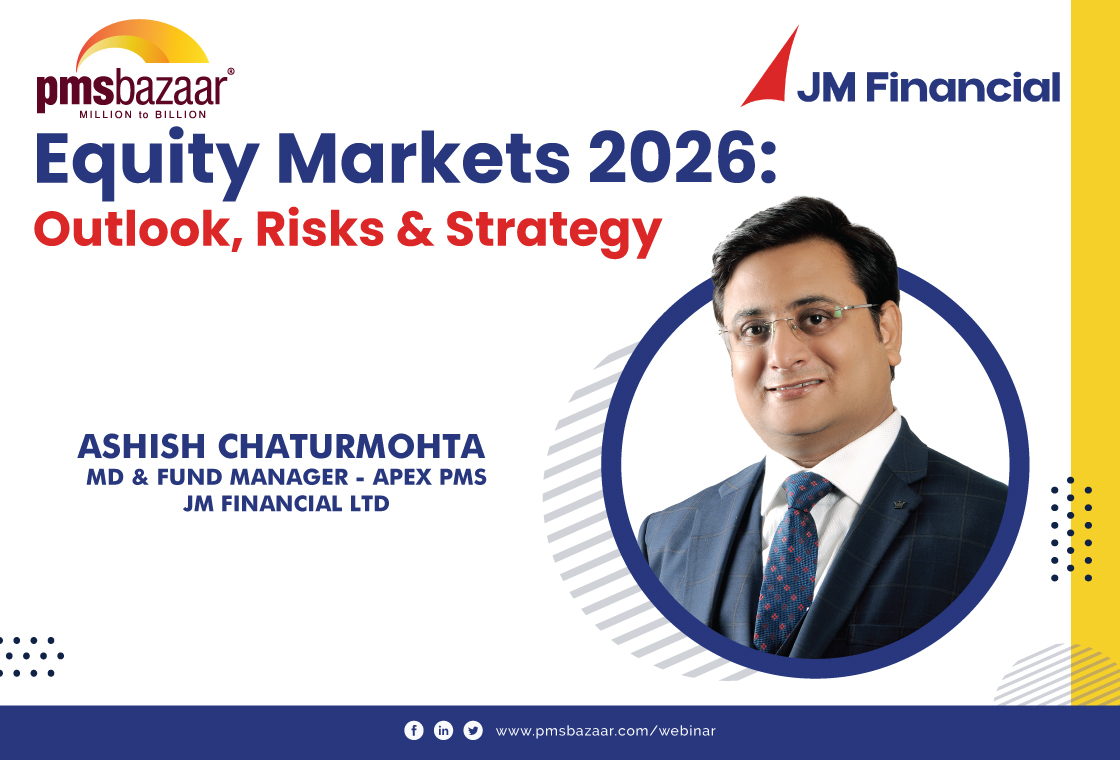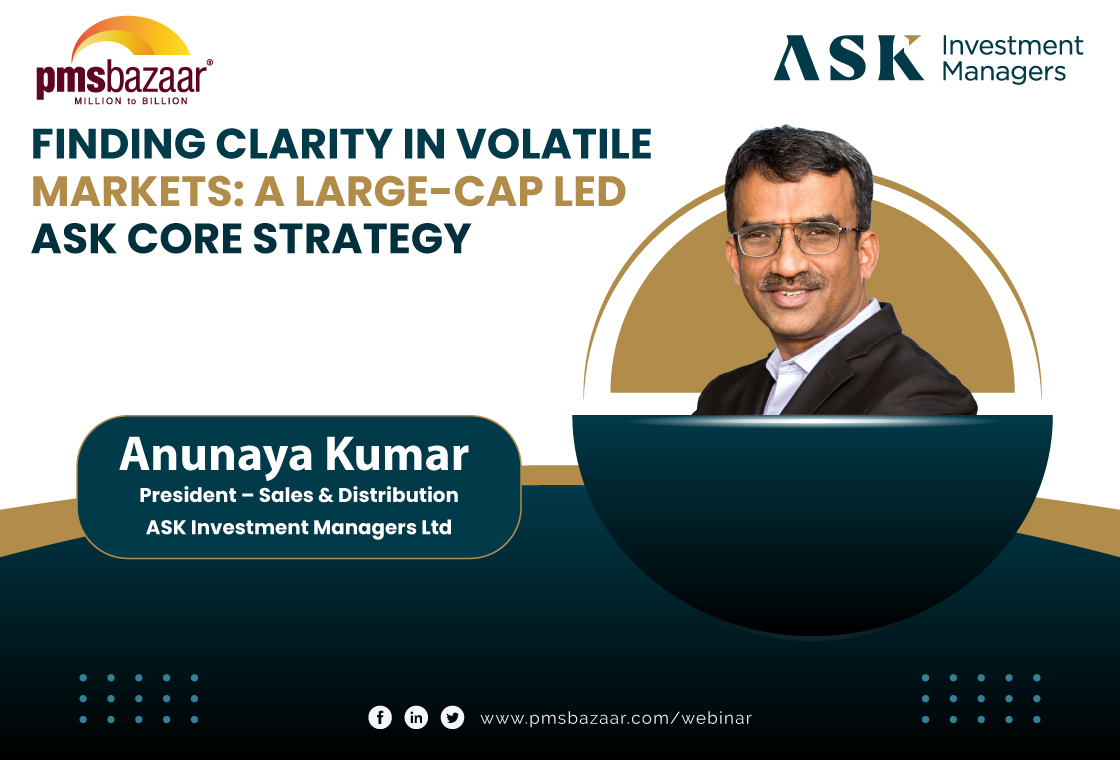The PMS Bazaar conducted a webinar on "How to Build a Winning Portfolio?" It featured Salvin Shah, Portfolio Manager, Equity, at Aditya Birla Capital.

Salvin Shah’s webinar began with an introduction to Aditya Birla Sun Life Mutual Fund, highlighting its large Assets Under Management (AUM). He then discussed the Portfolio Management Services (PMS) business, which offers seven strategies catering to different market caps and investment styles, including large-cap, mid-cap, multi-cap, and growth and value blends. Shah provided the example of a multi-cap growth portfolio and a top 200 portfolio that combined growth and value.
India's Special Opportunities Portfolio (ISOP) and Investing Fundamentals
Salvin Shah then introduced India's Special Opportunities Portfolio (ISOP), a six-year-old multi-cap thematic portfolio. He explained that Aditya Birla Sun Life’s investment philosophy was built on three cornerstones: the quality of the business, the management behind it, and the price paid.
Salvin Shah defined a good quality business as one that can grow faster than India's expected nominal GDP growth of 11-12%. He explained that sustainable profit growth comes from revenue growth rather than margin expansion, which eventually reaches a limit. He emphasised investing in businesses with a large and growing Total Addressable Market (TAM).
Salvin Shah also highlighted the importance of effective management in a business's success. He stated that effective management excels in both operational efficiency and the investment of incremental capital. He noted that finding a management team that balances these two aspects is essential for investment success.
Next, he spoke about the importance of valuation. He reminded attendees that investors make money when buying a stock, not when selling it. Even strong businesses can yield poor returns if bought at inflated prices.
Managing Risk and Understanding Market Conditions
Recognising that risk is inherent in investing, Salvin Shah outlined their approach to risk management. He mentioned that their portfolios are constructed of negatively correlated businesses to mitigate risks associated with industry-specific downturns. For example, if the rural economy was thriving, they would invest in businesses unrelated to that sector to safeguard against potential losses.
He also introduced their stop-loss trigger, which involves reassessing any investment that underperforms for six months, especially if it declines by 10% or more. They typically exit investments that underperform by 30%.
A detailed analysis of the current market conditions was provided, highlighting the volatility in October. He noted that the market, which began at approximately 25,000, had dropped to around 24,000, a decline of 3.56% over the last 18 days.
Macroeconomic events have become increasingly frequent in the past decade. These events, such as demonetization, the implementation of GST, the COVID-19 pandemic, and the Russian-Ukraine war in 2022, all had profound effects on market dynamics, further compounded by recent geopolitical tensions in the Middle East.
However, Salvin Shah highlighted that despite these challenges, markets have generally continued to move forward. For instance, the Nifty index had shown positive performance for eight consecutive years. He advised that as of 2024, investors should remain focused on long-term fundamentals and trends to navigate through the current volatility.
Market Correction, Foreign Portfolio Investments, and Future Outlook
The portfolio manager acknowledged that the ongoing market correction could be seen as a much-needed adjustment. He explained that the market had been in a bull run for nearly two years since bottoming out in March 2023. This continuous rally sparked discussions about valuations.
While acknowledging that the market appeared expensive, it was pointed out that the headline Nifty was trading at a forward price-to-earnings ratio of 21, only slightly above the ten-year average of 20.5. This suggested that while some sectors may exhibit signs of irrational exuberance, overall valuations were not excessively inflated.
Concerns regarding Foreign Portfolio Investors (FPIs) moving investments from India to China was also addressed. Salvin Shah explained that FPIs had been selling for some time in reaction to the Federal Reserve’s rate hikes. However, domestic investors were stepping in to absorb the selling pressure.
Domestic mutual funds currently held around Rs 2 lakh crores in cash, which could provide a cushion against market downturns. He also noted the decrease in FPI ownership to about 18%, the lowest in several years. This shift indicated a transition of market ownership towards domestic investors, a positive sign for the resilience of the Indian market.
Looking ahead to the upcoming quarterly results, he highlighted that companies had faced margin pressures due to rising wholesale prices in 2022. However, with wholesale price inflation (WPI) decreasing in 2023, many corporates had experienced margin expansion. While he anticipated that top-line growth might moderate in the current quarter, the festive season could boost demand, resetting expectations for the fiscal year 2026.
Equities, Asset Allocation, and Sector Preferences
Salvin Shah firmly believed in the potential of equities for long-term growth. He stated that investing in equities meant purchasing a stake in businesses with opportunities for expansion and innovation, making equities a favourable investment class compared to other assets.
Shah recommended an ideal investment portfolio allocation of 50% in large caps and 50% in mid and small caps. While acknowledging the challenges in finding new investment ideas in the mid and small-cap segments, he emphasized that opportunities still existed in high-quality stocks in these categories.
Shah explained that effective risk mitigation begins with portfolio construction. To counteract the risks of disappointing earnings growth and valuation deviations, he focuses on investing in businesses that offer an asymmetric risk-reward profile and diversifying the portfolio with negatively correlated assets. A strong stop-loss mechanism is also in place to safeguard against unexpected market downturns.
Regarding sector preferences, Shah expressed optimism about the consumer discretionary sector due to rising income levels in India. He also saw potential in technology and the cement industry, anticipating demand growth post-monsoon. Conversely, he advised caution with consumer staples, where high valuations did not align with expected earnings growth. By remaining selective and patient, Shah aims to capitalize on genuine investment opportunities, positioning his portfolio for long-term success.
The webinar concluded with Shah answering questions from the audience. For more insights, you can watch the full video from the link below:
Get access to rich data and analytics of PMS & AIF by subscribing to us. Join the 70000+ investors & experts: Subscribe NOW
Disclaimer: Any Stocks/sectors mentioned in this blog are for educational purposes only. This blog does not constitute financial advice. Please consult with a qualified financial advisor before making any investment decisions
Recent Blogs

Aurum Multiplier Portfolio - Where Small and Mid-Cap Alpha Meets Large-Cap Stability
PMS Bazaar recently organized a webinar titled “Aurum Multiplier Portfolio - Where Small and Mid-Cap Alpha Meets Large-Cap Stability,” which featured Mr. Sandeep Daga, MD& CIO, Nine Rivers Capital and Mr. Kunal Sabnis, Portfolio Manager, Nine Rivers Capital. This blog covers the important points shared in this insightful webinar.

Flat Markets, Wide Outcomes: How 484 PMS Strategies Performed in Dec 2025
December 2025 was a month where market returns stayed close to flat, with the Nifty 50 TRI at -0.28% and the BSE 500 TRI at -0.24%.

Equity Markets 2026: Outlook, Risks and Strategy
PMS Bazaar recently organized a webinar titled “Equity Markets 2026: Outlook, Risks and Strategy,” which featured Mr. Ashish Chaturmohta, MD & Fund Manager – APEX PMS, JM Financial Limited. This blog covers the important points shared in this insightful webinar.

MICRO CAPS: The Dark Horses of the Indian Equity Market
PMS Bazaar recently organized a webinar titled “MICRO CAPS: The Dark Horses of the Indian Equity Market,” which featured Mr. Rishi Agarwal and Mr. Adheesh Kabra, both Co-Founders and Fund Managers, Aarth AIF. This blog covers the important points shared in this insightful webinar.

Finding Clarity in Volatile Markets: A Large-Cap Led ASK CORE Strategy
PMS Bazaar recently organized a webinar titled “Finding Clarity in Volatile Markets: A Large-Cap Led ASK CORE Strategy,” which featured Mr.Anunaya Kumar, President – Sales and Distribution ASK Investment Managers Limited. This blog covers the important points shared in this insightful webinar.
.jpg)
Passively Active Investing — A Modern Investor’s Lens on ETF-Based PMS
PMS Bazaar recently organized a webinar titled “Passively Active Investing — A Modern Investor’s Lens on ETF-Based PMS,” which featured Mr. Karan Bhatia, Co-Founder and Co-Fund Manager , Pricebridge Honeycomb ETF PMs. This blog covers the important points shared in this insightful webinar.

Spot the Trouble: Red Flags in Equity Investment Analysis
PMS Bazaar recently organized a webinar titled “Spot the Trouble: Red Flags in Equity Investment Analysis,” which featured Mr. Arpit Shah, Co-Founder & Director, Care Portfolio Managers. This blog covers the important points shared in this insightful webinar.

Long-Only AIFs Rebound Sharply in October; Long-Short Strategies Lag Despite Lower Volatility
106 long-only AIFs averaged 3.68% vs 32 long-short AIFs at 2.7%; only 24–31% of funds beat key indices

